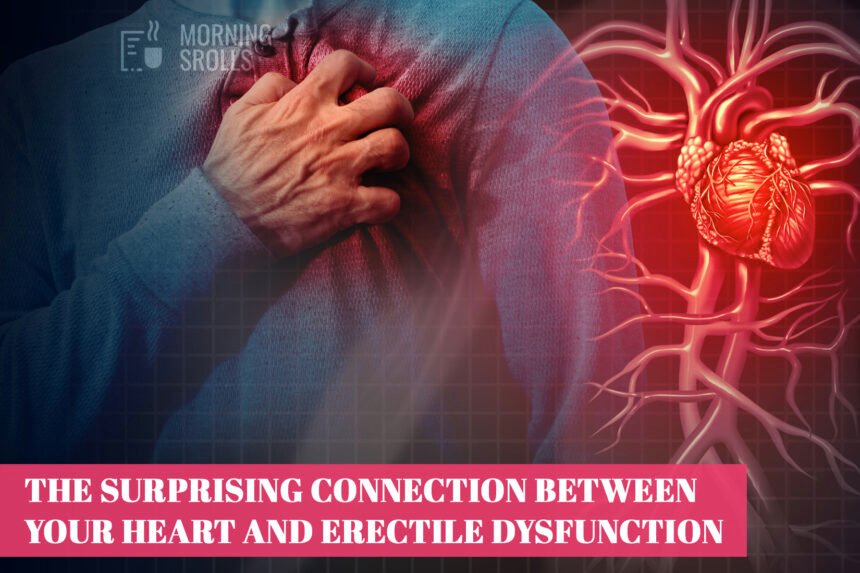The Connection between your Heart and Erectile dysfunction is difficulty in achieving and maintaining a strong erection for sexual activity — may serve as an early indicator of existing or potential heart issues. If you are managing heart disease, appropriate treatment could potentially improve your erectile dysfunction. Addressing your heart condition can lead to improvements in your sexual health, as effective management of heart issues often positively impacts erectile function. Recognize the link and explore your options for addressing it.

Understanding Erectile Dysfunction (ED)
Erectile dysfunction (ED) is a common issue that impacts a significant number of men, especially as they grow older. Studies show that around 15% of men in their 40s and 50s struggle with ED, and this figure rises to nearly 50% for men in their 60s. As age increases, the likelihood of experiencing difficulties with erections also tends to rise. The prevalence increases significantly for men in their 70s and older.
If you find yourself struggling to achieve or maintain an erection at times, it’s important to know that you are not alone. At the Men’s Wellness Clinic, our committed team has assisted countless men across various age groups in overcoming erectile dysfunction (ED). We specialize in providing effective solutions tailored to each individual’s needs, ensuring that our patients receive the support they deserve. We are dedicated to identifying the underlying causes of your condition and supporting you in restoring your sexual health.
Importance of understanding the link between ED and heart health
Erectile dysfunction (ED) and heart issues are closely related, and understanding this link is crucial. Traditionally, it was thought that the accumulation of plaques in the arteries, known as atherosclerosis, was the main reason why ED often appears before heart problems. This theory proposed that the accumulation of plaque in the arteries limits blood flow to the penis, which can make it difficult to get or maintain an erection.
However, recent insights from experts indicate that the relationship is more complex. They now believe that when ED occurs before heart issues, it is frequently due to problems with the inner lining of blood vessels (the endothelium) and the smooth muscle. When the endothelium is not functioning properly, it can lead to insufficient blood flow to both the heart and the penis, contributing to the development of atherosclerosis. This underscores the significance of recognizing erectile dysfunction as a possible early indicator of heart health issues. Addressing ED promptly can help identify and manage underlying cardiovascular problems.
Overview of erectile dysfunction (ED) and its significance
Erectile dysfunction (ED) and heart disease are often connected because they share similar causes and risk factors. While having ED doesn’t always mean you have a heart problem, it can sometimes be an early sign that your blood vessels aren’t as healthy as they should be. This is especially true if there’s no clear reason for your ED, like an injury or psychological stress.
Why Are ED and Heart Disease Related?
Both erectile dysfunction (ED) and heart issues frequently stem from blood flow problems. Since the arteries in the penis are narrower than those in the heart, any blockages or damage to the blood vessels can lead to ED symptoms appearing before any signs of heart disease become noticeable. Studies have shown that men with ED, particularly younger men, are at a higher risk for future heart problems, even if they don’t have any other symptoms.
Shared Risk Factors
Erectile dysfunction and heart disease share several overlapping risk factors, including:
– Diabetes: Elevated blood sugar levels can harm blood vessels and nerves, contributing to the development of both erectile dysfunction and cardiovascular issues.
– Smoking: Tobacco use harms blood vessels, increasing the risk of vascular disease and making ED more likely.
– Alcohol: Heavy drinking can raise blood pressure and cholesterol, contribute to heart disease, and make ED worse.
– High blood pressure: Chronic hypertension can gradually harm the arteries, impairing blood circulation to both the heart and the penis.
– High cholesterol: Too much LDL (“bad”) cholesterol can clog arteries, causing atherosclerosis and reducing blood flow.
– Obesity: Carrying extra weight increases the risk for both ED and heart disease by worsening other risk factors.
– Low testosterone: Reduced testosterone levels: Men with low testosterone are more susceptible to both erectile dysfunction and cardiovascular problems.
– Age: ED becomes more common as men get older, but if you’re under 50 and develop ED, it may be a stronger warning sign for heart disease.
What Can You Do About It?
If you’re experiencing erectile dysfunction, it’s crucial to discuss this with your doctor. It’s not only a matter of sexual health; it’s also essential to consider your heart health. Your doctor may want to check your blood pressure, cholesterol, blood sugar, and other heart risk factors before starting any ED treatment. Sometimes, further heart tests may be recommended if your risk is high.
Lifestyle Modifications Beneficial for Erectile Dysfunction and Heart Health
Improving your overall health can have a positive effect on both your ED and your heart. Here’s what you can do:
– Stay active: Engaging in regular physical activity enhances blood circulation and promotes heart health, which can also alleviate erectile dysfunction.
– Follow a nutritious diet: Consuming a balanced diet filled with fruits, vegetables, whole grains, and healthy fats fosters better blood flow.
– Keep a healthy weight: Shedding excess weight can reduce the likelihood of developing both erectile dysfunction and heart disease.
– Quit smoking: Stopping tobacco use improves blood vessel health and reduces risk for both conditions.
– Limit alcohol: Drinking less can help control blood pressure and cholesterol, and may improve erections.
– Manage stress: Reducing stress can benefit your heart and your sexual health.
Research has shown that men who make these lifestyle changes often see improvement in their ED and a lower risk of heart problems.
Medical Treatment
If you have both ED and heart disease, your doctor will help you find safe treatment options. Some medications for ED, like sildenafil (Viagra), are generally safe for men with stable heart disease, but they should never be used with certain heart medications, especially nitrates, because of dangerous interactions. Always check with your doctor before starting any new medication for ED if you have heart issues.
Key Takeaways
– ED and heart disease are often linked because they share the same underlying blood vessel problems and risk factors.
– ED can be an early warning sign of heart trouble, especially in younger men or those without obvious causes for ED.
– Simple changes like eating healthier, exercising regularly, losing extra weight, and quitting smoking can boost both your heart health and improve erectile function
– Always talk to your doctor about ED, as it may prompt important screening for heart disease and help prevent future problems.
Addressing ED is not just about improving sexual health- it’s an important step in protecting your heart and overall well-being.










